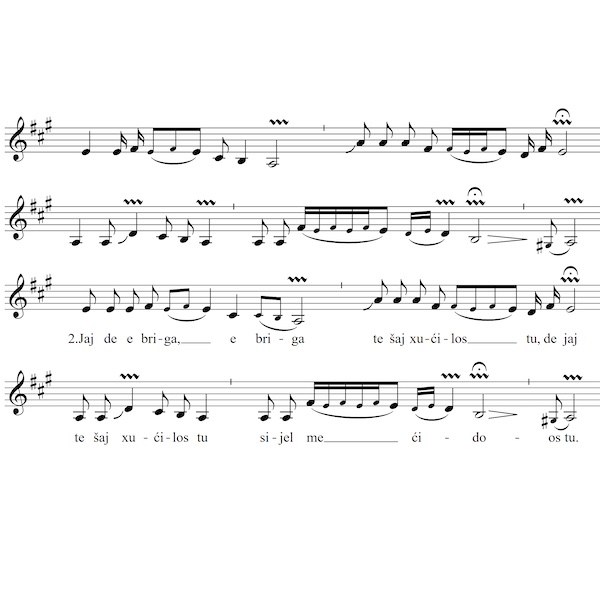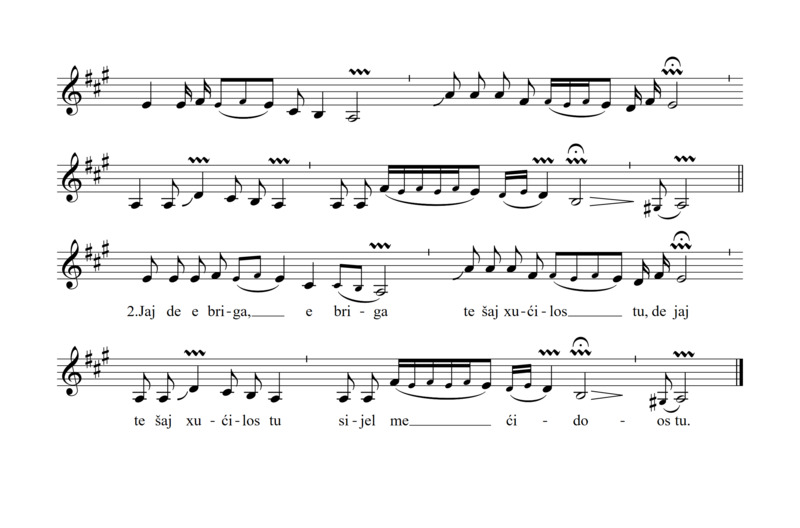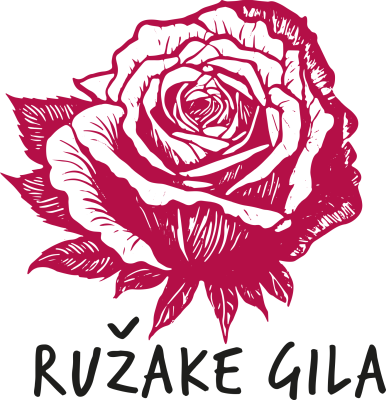
E briga, e briga
- Genre
- langsames Lied
- Thema
- Gefängnislied
- DOI
- doi.org/10.21939/cm1v-6y62
Content
Recordings
E briga, e briga is a sad song told from the perspective of a Roma man in prison. He laments his miserable circumstances and longs for his wife to get him out of prison.
Musical transcription based on the booklet accompanying the CD Amare gila - Unsere Lieder / Our Songs
In the Lovari song tradition, there are several prison songs that tell of the sorrow of imprisonment. E briga, e briga is one of them. In it, a prisoner longs for his wife and wishes for her to set him free. However, he waits in vain as his wife does not appear. Anger and jealousy arise in him, mixed with the expression of his suffering in captivity.
Ruža Nikolić-Lakatos sings E briga, e briga without guitar accompaniment. The recording was made by ethnomusicologist Ursula Hemetek in 1993.
Commentary
(GERMAN ONLY) Ruža Nikolić-Lakatos and her husband Mišo Nikolić explain the ethnomusicologist Ursula Hemetek the content and background to E briga, e briga. They emphasise that the song is based on a true story and was really written in prison. The recording was made during a field research interview in 1992 at the Nikolić family home.
Lyrics
Stanza 1
| [Syllalbles] | [Syllables] |
Stanza 2
| Jaj de i briga, i briga, | Sorrow, sorrow |
| te šaj xutjilos tu de jaj, | if I could catch you, |
| te šaj xutjilos tu, | if I could catch you, |
| sijel me kjidos tu. | I would tear you apart. |
Stanza 3
| Jaj de ande pelem mamo | I went to prison, |
| ando vesedelmo de jaj, | I went to prison, |
| ando vesedelmo | in prison [I am], |
| maškar le falura. | surrounded by high walls. |
Stanza 4
| Jaj de le maj avri, čore, | Get me out, girl, |
| po Del me mangav tut de jaj, | I beg you in God's name, |
| na muk, šeje, na muk | Don’t let me, girl, don’t let me |
| de čoro te xasajvav. | perish miserably. |
Stanza 5
| Jaj de avel o vonato | The train is coming, |
| a Peštako gjoršo de jaj, | the express train to Budapest, |
| pe kodo žukarav | and in this train I expect |
| mura čora gaža. | my poor wife. |
Stanza 6
| Jaj de o vonato reslas | The train has arrived, |
| taj voj inke niči de hej. | but she hasn’t. |
| Faj ma šingerdas la | Perhaps she was run over |
| a Peštako gjoršo. | by the Budapest express train. |
Stanza 7
| Jaj de phari i robija, | The dungeon is heavy, |
| xal la i pustija de hej, | cursed it shall be, |
| ke bešlem ande, mamo, | because I spent, mother, |
| e but kale beršora. | so many black years inside. |
Further Material
(GERMAN ONLY) from 17:57: Commentary to E briga, e briga and the prison songs
Zitierempfehlung anzeigen
Bitte zitieren Sie diese Seite wie folgt:
Music and Minorities Research Center, "E briga, e briga", Ružake gila, zuletzt besucht am Loading date..., doi.org/10.21939/cm1v-6y62


